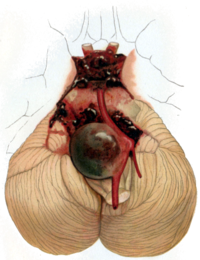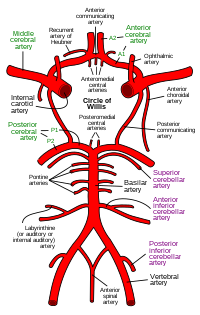
Third nerve decompression by anterior petroclinoid ligament opening after clipping of posterior communicating artery aneurysm—How I do it
Sign Up to like & getrecommendations! Published in 2018 at "Acta Neurochirurgica"
DOI: 10.1007/s00701-018-3666-x
Abstract: BackgroundPosterior communicating artery aneurysms sometimes present with partial or complete oculomotor nerve palsy, due to direct oculomotor nerve compression, irritation by subarachnoid blood, or both. Superiority of surgical clipping over endovascular coiling in terms of… read more here.
Keywords: nerve decompression; decompression; communicating artery; petroclinoid ligament ... See more keywords

Impact of subcallosal artery origin and A1 asymmetry on surgical outcomes of anterior communicating artery aneurysms
Sign Up to like & getrecommendations! Published in 2021 at "Acta Neurochirurgica"
DOI: 10.1007/s00701-021-04979-w
Abstract: Surgical clipping of anterior communicating artery (ACoA) aneurysms remains challenging due to their complex anatomy. Anatomical risk factors for ACoA aneurysm surgery require further elucidation. The aim of this study is to investigate whether proximity… read more here.
Keywords: subcallosal artery; surgical outcomes; anatomy; communicating artery ... See more keywords

Morphological and clinical risk factors for the rupture of posterior communicating artery aneurysms: significance of fetal-type posterior cerebral artery
Sign Up to like & getrecommendations! Published in 2019 at "Neurological Sciences"
DOI: 10.1007/s10072-019-03991-4
Abstract: BackgroundPosterior communicating artery (PcomA) aneurysm can be classified into sidewall or bifurcation types based on the anatomical variation of fetal-type posterior cerebral artery (fPCA). The aims of this study were to investigate the significance of… read more here.
Keywords: morphological clinical; risk; artery; communicating artery ... See more keywords

Cognitive outcome after surgical clipping versus endovascular coiling in patients with subarachnoid hemorrhage due to ruptured anterior communicating artery aneurysm
Sign Up to like & getrecommendations! Published in 2019 at "Acta Neurologica Belgica"
DOI: 10.1007/s13760-019-01245-w
Abstract: Ruptured anterior communicating artery aneurysms are commonly associated with deficits in memory and executive functions. However, little studies are available on the effect of surgical clipping (SC) and endovascular coiling (EC) on cognitive functioning. This… read more here.
Keywords: ruptured anterior; executive functions; communicating artery; anterior communicating ... See more keywords

Ruptured aneurysm of the posterior inferior cerebellar artery communicating artery: A case report
Sign Up to like & getrecommendations! Published in 2022 at "Clinical Neurology and Neurosurgery"
DOI: 10.1016/j.clineuro.2022.107188
Abstract: We report a case of a ruptured aneurysm of the posterior inferior cerebellar artery (PICA) communicating artery, which is an extremely rare condition, with only 10 other cases reported in the literature. We repaired the… read more here.
Keywords: communicating artery; ruptured aneurysm; inferior cerebellar; posterior inferior ... See more keywords

Posterior communicating artery occlusion and recanalization through a fusiform aneurysm after flow diversion
Sign Up to like & getrecommendations! Published in 2018 at "Journal of Clinical Neuroscience"
DOI: 10.1016/j.jocn.2018.06.047
Abstract: Occlusion of branch vessels is a known potential sequela of the treatment of intracranial aneurysms with flow diversion. We present a case of occlusion and distal reconstitution of the origin of the posterior communicating artery… read more here.
Keywords: posterior communicating; flow diversion; aneurysm; communicating artery ... See more keywords

Simple assessment of the localization of posterior communicating artery aneurysms to the anterior petroclinoid ligament
Sign Up to like & getrecommendations! Published in 2019 at "Journal of Clinical Neuroscience"
DOI: 10.1016/j.jocn.2019.05.030
Abstract: The microsurgical management of posterior communicating artery (PCoA) aneurysms can be modified depending on their localization, with respect to the tentorial edge consisting of the anterior petroclinoid ligament (APCL). However, the imaging of APCL has… read more here.
Keywords: posterior communicating; anterior petroclinoid; pcoa aneurysms; line ... See more keywords

Greater hemodynamic stresses initiated the anterior communicating artery aneurysm on the vascular bifurcation apex
Sign Up to like & getrecommendations! Published in 2022 at "Journal of Clinical Neuroscience"
DOI: 10.1016/j.jocn.2021.12.005
Abstract: OBJECTIVE To investigate hemodynamic stresses associated with the anterior communicating artery (Acom) aneurysm formation using computational fluid dynamics (CFD) analysis. METHODS Three-dimensional geometries of the anterior cerebral artery (ACA) bifurcations in 20 patients with Acom… read more here.
Keywords: communicating artery; anterior communicating; aneurysm; bifurcation ... See more keywords

A1 asynchrony, a potential risk factor for the rupture of anterior communicating artery aneurysms: A computational fluid dynamics study.
Sign Up to like & getrecommendations! Published in 2019 at "Neurocirugia"
DOI: 10.1016/j.neucir.2019.04.002
Abstract: INTRODUCTION AND OBJECTIVES The anterior communicating complex is one the most common locations for aneurysm development. It receives blood from both carotid circulations and the effect of synchrony on the arrival of blood flow has… read more here.
Keywords: artery; fluid dynamics; artery aneurysms; communicating artery ... See more keywords

Isolated Subcallosal Artery Infarction Secondary to Localized Cerebral Vasospasm of Anterior Communicating Artery Complex Following Subarachnoid Hemorrhage.
Sign Up to like & getrecommendations! Published in 2017 at "World neurosurgery"
DOI: 10.1016/j.wneu.2017.07.052
Abstract: BACKGROUND Subcallosal artery (ScA) infarction is a well-recognized but uncommon complication of surgical treatment of anterior communicating artery aneurysms. CASE DESCRIPTION An elderly man presented with massive subarachnoid hemorrhage due to left posterior communicating artery… read more here.
Keywords: subcallosal artery; artery; vasospasm; communicating artery ... See more keywords

The Resolution of Oculomotor Nerve Palsy Caused by Unruptured Posterior Communicating Artery Aneurysms: A Cohort Study and Narrative Review.
Sign Up to like & getrecommendations! Published in 2017 at "World neurosurgery"
DOI: 10.1016/j.wneu.2017.07.123
Abstract: OBJECTIVE Recovery of oculomotor nerve palsy after microsurgical and endovascular treatment has been studied in numerous small series of predominantly ruptured aneurysms. Little consideration has been given to the distinction between ruptured and unruptured aneurysms.… read more here.
Keywords: nerve palsy; posterior communicating; palsy; communicating artery ... See more keywords